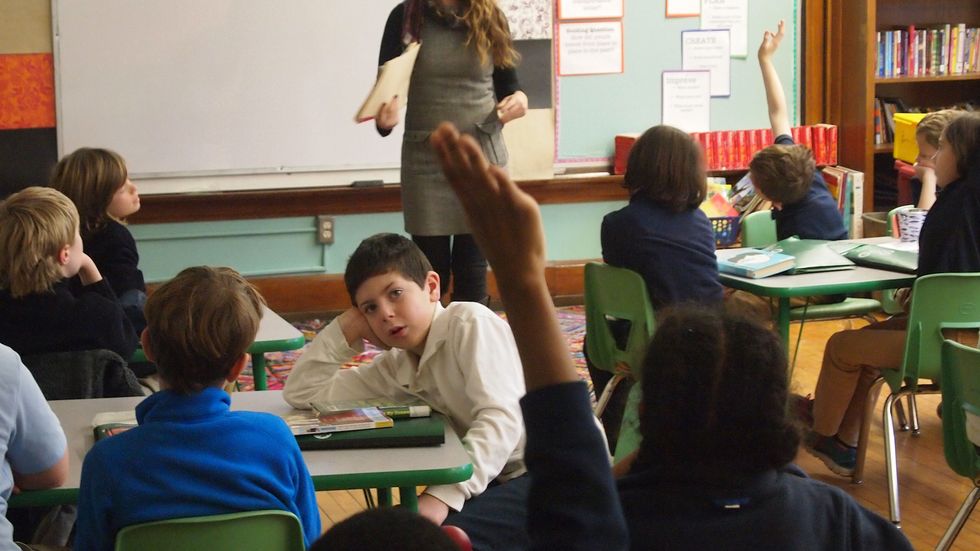Dear America,
As a senior in college, my days of being in a classroom are coming to an end (at least for a little while). For nearly my entire life, school has been all I've known and one of my most valued experiences. In fact, after family and friends, education is number three on my list of most important things in life.
But after years of deciding on a career path, I've continuously gone in the same circle of fighting the urge to become an educator. Since middle school, I've known it was something I was meant to do but was always deterred by the ever-growing list of struggles teachers face, struggles that continue to pile up and get ignored by parents, school boards, and our own government.
In a way, part of me feels like these struggles could possibly be ignored and that what you get out of being a teacher compensates for all of the bad stuff. However, I have known too many great teachers who have become burnt out from their job despite their love for their kids and teaching.
Some would never say it to their kids, but you can tell in their eyes that the way the system is now is not what they originally got into or what they were originally expecting.
Based on what I've learned in the classroom, what I've heard from talking to my teachers, and research I've done on my own, the following is an extremely short list of reasons on why I blame you, America, for tainting my dream of becoming a teacher:
1. Lack of classroom funds.
Even since I was in grade school, teachers have never gotten the funds to properly develop their classrooms. Typically, the majority of educational supplies or basic necessities (tissues even!), come out of the teacher's pocket. For teachers who work in low-economic areas, some spend even more money out of their own pocket to provide lunches and school supplies for kids who cannot afford them.
2. Having to take their work home.
Despite what kids think, teachers have homework too. Grading and curriculum-writing take hours and hours of time each week that is almost never provided during the school day and is never compensated for outside of school.
3. How much screen time their kids are getting at home.
While I could go into a completely new essay on this topic, I'll just say that while technology is incredible, parents too often use their devices as babysitters. Starting as young as infants, smartphones and tablets are used as a pacifier for kids and we are now starting to see how that is affecting children in the classroom. Children are struggling with their ability to self-soothe because growing up, technology did it for them.
So, when it comes to dealing with frustration or social problems in the classroom, we are now seeing that kids are incapable with coping and will even go as far as having a full-blown meltdown in times of emotional distress.
4. Parent involvement.
Nowadays there is such a contrast in parent involvement that is challenging on both sides of the spectrum. While this isn't exactly a new concept, it seems to be more extreme now more than ever. Parents now have more access than ever to their kids' education, which can really hinder how a teacher is able to teach their students. If a parent doesn't like the way their child is being taught or disciplined, they have nearly full power over the teacher to change that. Because schools appease parents as much as they do, it really limits how teachers are able to educate their kids even though they most likely know what's best for their child educationally.
On the opposite side of the spectrum, some parents take little to no interest in their child's life at school. Many parents put the responsibility of discipline and raising of children entirely on the teacher.
5. Low compensation.
While the role of an educator is arguably one of the most important out there, teachers still receive sub-par compensation for all of the work they do inside of the classroom as well as the work that they bring home.
6. Standardized curriculum.
Styles of learning vary from classroom to classroom year to year, so it would make sense for teachers to have the freedom to design their own curriculum but it's so often not the case. Because of standardized testing (which is actually the worst by the way), teachers often have to incorporate standardized curriculums into their teaching to prepare kids to do well on their standardized tests.
America, schools are supposed to be institutions of improvement and growth. By ignoring the pleas from teachers across the country we are not only hurting our educators, we are subsequently hurting the children who are responsible for the betterment of our future. While before it seemed like a realistic hope for some of these things to have changed since I was in middle school, it seems the education system has only gotten worse with no signs of improvement. My only hope is that one day, you'll see your errors and get your act together, America.
Sincerely,
A devastated student.





 Photo by
Photo by  Photo by
Photo by 
 Photo by
Photo by 


















